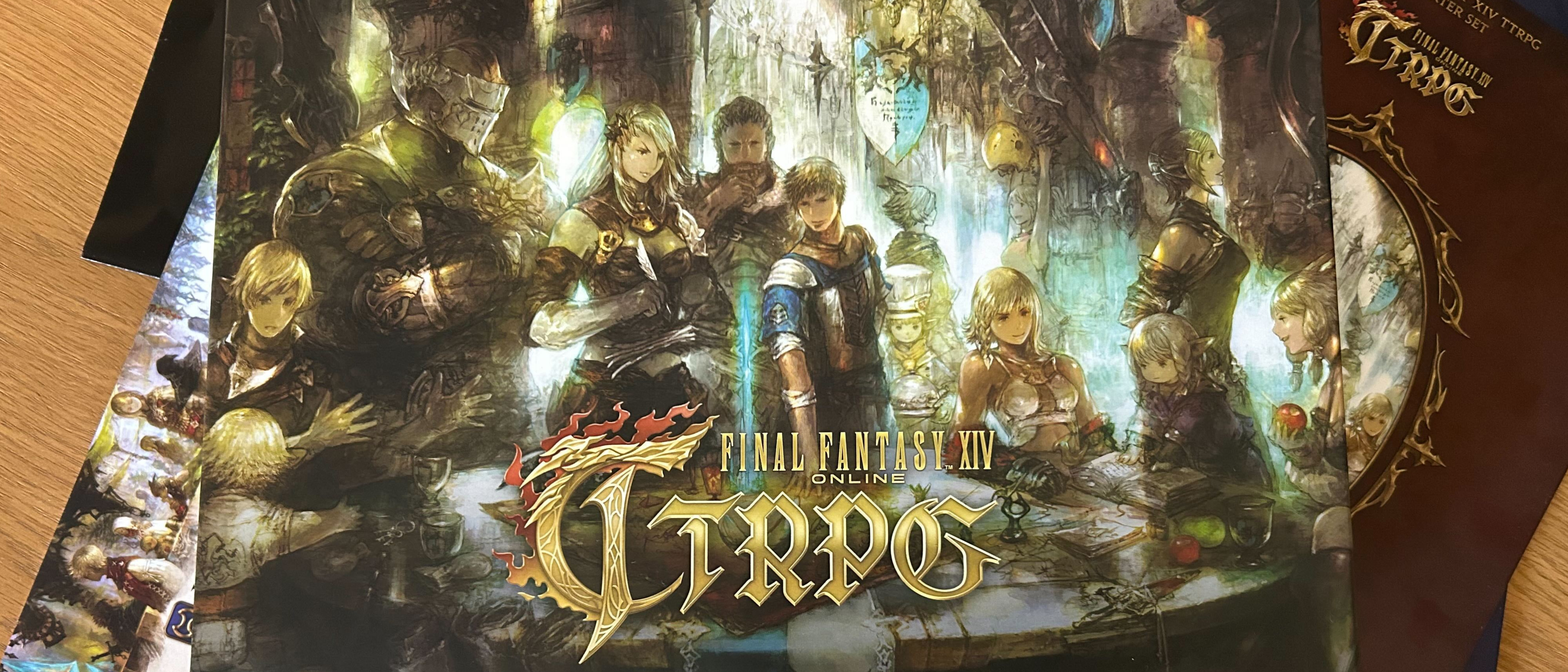GamesRadar+ Verdict
As a direct adaptation of Final Fantasy XIV’s MMO gameplay, this official tabletop RPG has plenty to offer. Combat is fast and exciting, with auto-hits and area-of-effect mechanics helping it stand apart as more than just another D&D-like. It’s just a shame that this Starter Set seems to hold so much back from the upcoming rulebook, with a limited number of scenarios, few options for further character customisation and a reliance that your group is already familiar with Eorzea. If you love XIV and want to get into roleplaying, it’s a good place to start - otherwise, perhaps wait for the full book.
Pros
- +
Feels highly faithful to the MMO’s jobs, skills, world, and story
- +
Combat is slick and satisfying thanks to guaranteed hits and unique AOE mechanics
- +
Very easy rules to pick up for TRPG newcomers, especially if you’ve played FF14
Cons
- -
Barebones gameplay options beyond the basics, with few options for customisation
- -
Starter set is quite pricey given the short campaign included and minimal options to continue on without the full rulebook
- -
Non-Final Fantasy XIV fans may struggle with assumption of knowledge about its world
Why you can trust GamesRadar+
It seems somewhat unbelievable that it has taken Final Fantasy, a video game series that started life only a decade or so after Dungeons & Dragons revolutionised tabletop roleplaying, almost 40 years to see an official tabletop RPG adaptation. Even then, the Final Fantasy XIV TRPG Starter Set is still only part of a full Final Fantasy tabletop RPG, offering a barebones preview of an upcoming standard rulebook for the TRPG - yet to be given a release date - based on the highly popular MMO instalment.
While the Starter Set feels limited in its scope – frustratingly so at times – what is here has enough promise for those Final Fantasy XIV fans looking to take a leap into the best tabletop RPGs for the first time, mostly thanks to its highly faithful take on the world of Eorzea and some unique ideas around its MMO-inspired combat that makes it far more than just another D&D clone.
Final Fantasy XIV TTRPG Starter Set features & design
| Price | $60 / £51 |
| Ages | 14+ |
| Genre | Fantasy |
| Players | 3 - 5 |
| Complexity | Low |
| Lasts | 2hrs+ per session |
| System | Final Fantasy XIV TTRPG |
| Publisher | Square Enix |
| Play if you like | Final Fantasy XIV, JRPGs, rules-lite games |
- Features basic rules & three adventures
- Focuses on accessibility
- Expensive for what you're getting
This is a Starter Set in the very extreme sense of the term, presenting two short rules booklets – one for players and another for the Game Master running their adventures, including three introductory scenarios – and four pre-generated character sheets based on FFXIV’s Warrior, Black Mage, White Mage and Dragoon jobs. Also in the box are some nice custom dice (color-coded for each class type of Healer, DPS and Tank), some paper maps, and cardboard tokens to represent attack zones, NPCs, and enemies. At $60 / £51 from the Square Enix store, it’s overpriced for a typical RPG box set, despite the good level of component quality, but par for the course for merchandise from the Final Fantasy publisher.
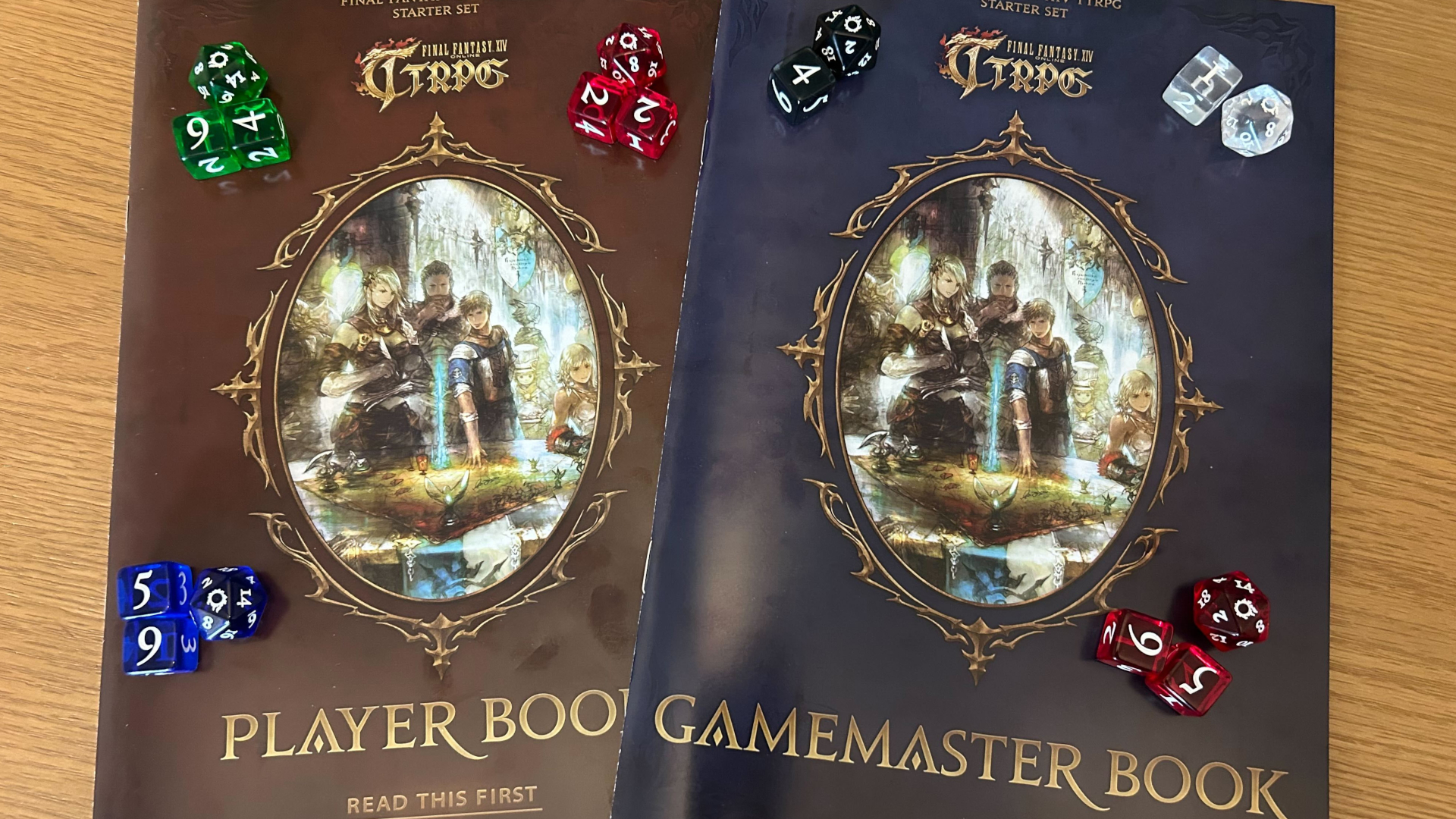
Those books make clear who this set is for, with almost the first half of the Player Book opening with a series of tutorials that run through examples of gameplay using a combination of comic strips and chat boxes. The rules and presentation here are aimed at Final Fantasy XIV players who’ve never played another tabletop RPG before, not seasoned D&D or Pathfinder vets looking for a fantasy alternative. While the rulebooks as a whole lack some clarity in spots that RPG rules-checkers may find frustrating, on the whole they do an efficient job of easing players into the very basics of how to play.
That’s helped by the RPG’s core gameplay, which uses a light set of rules focused around rolls of a 20-sided die, modified by a simple set of character traits such as Speed, Vitality and Dexterity. Don’t mistake it for another D&D-based d20 system, though; there’s a lightness of dice math and overall crunch here that makes this a much more breezy and beginner-friendly experience to both learn and play, for better and worse.
Final Fantasy XIV TTRPG Starter Set gameplay
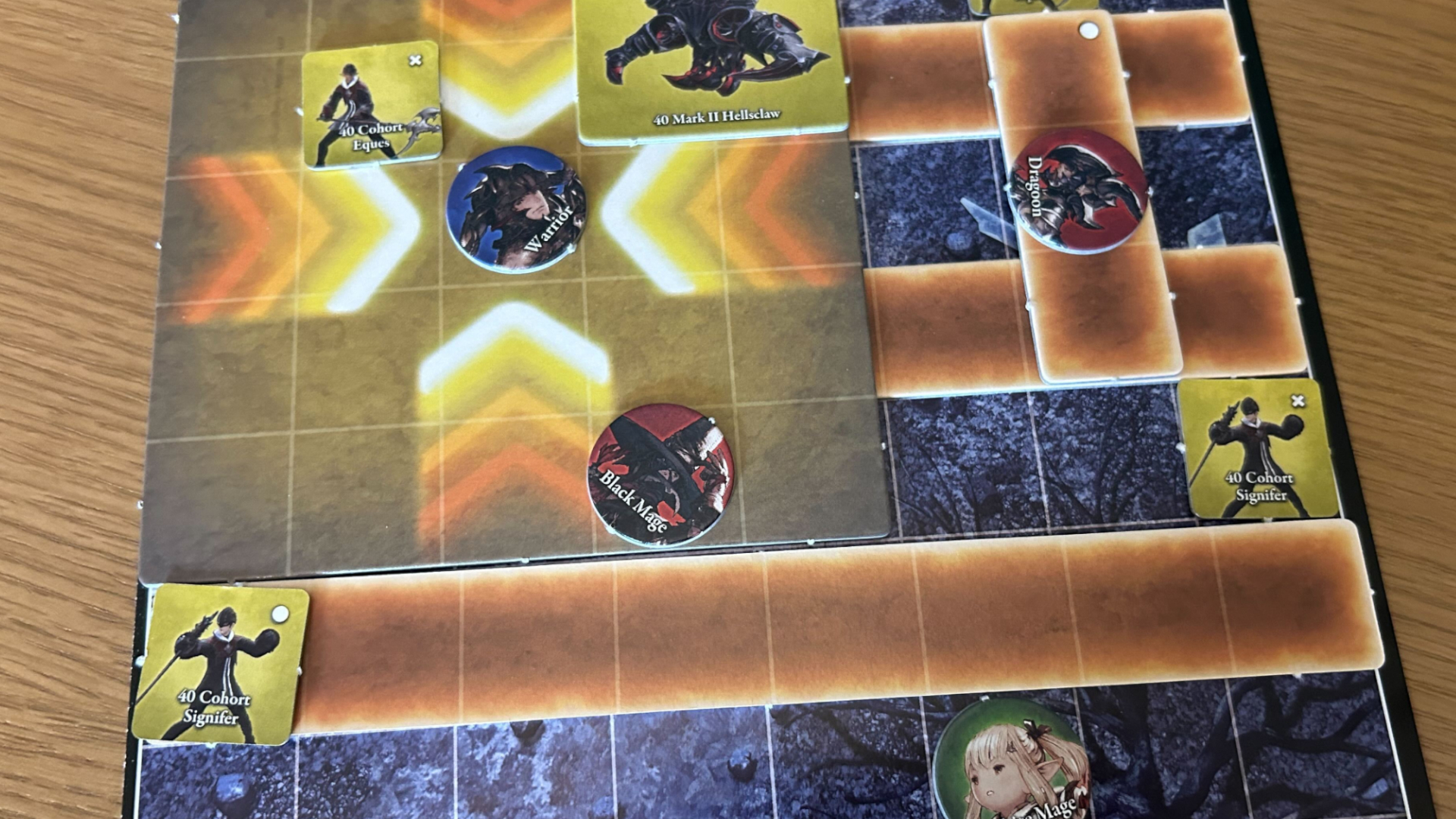
- Combat is dynamic & doesn't drag
- Features locations & characters from A Realm Reborn
- Lacks personalization and progression
That light-touch approach is especially true of combat, the highlight of the system. Taking inspiration directly from FFXIV’s MMO battles, combat revolves around strategic use of your skills to form strings of rotations. Players can perform one primary and one secondary action on their turn, as well as moving – or sacrificing movement to gain an extra secondary action – with the chance to combo certain moves into others for free. They can also use instant abilities on other characters’ turns – allied or enemy – to respond with helpful protection spells or to stun a foe lining up a damaging attack, a dynamic way of keeping all players involved in the fight at all times.
Jobs work as you would expect from the MMO, as Tanks draw enemies’ attention with Enmity before DPS whittle down their health and Healers provide support; a downside being that the set’s encounters are all explicitly designed for a ‘light party’ of four players, with the less-than-ideal option to create NPC companions such as chocobos in place of missing humans. In another video game-y touch, bigger battles have dedicated rules for separate phases, transforming bosses into new forms while the players see their limited abilities reset. Powerful limit breaks, meanwhile, become available when the GM decides. And if you die, the rules’ recommendation is to simply restart the fight, rather than permadeath.
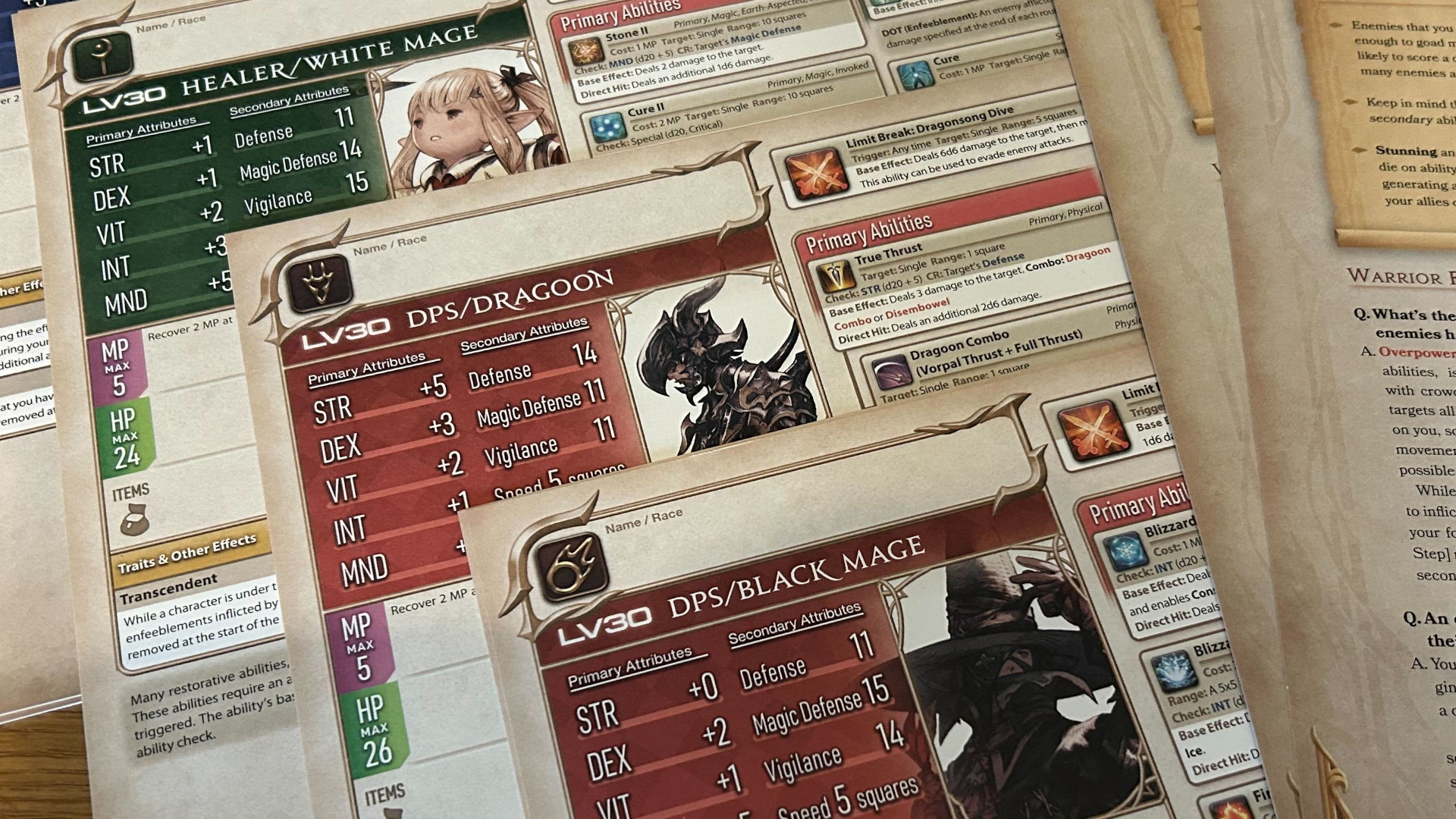
Once you've gotten your head around this beginner box, you have a couple of options. First up is the Standard Rulebook, which features a deep dive on mechanics and character creation. Next is the Scenario & Gamemaster Guide to help GMs create and run their own adventures. Premade scenarios are included too.
Unfortunately, there isn't a firm release date for either of these yet beyond a vague 'coming soon.'
In a notable change from rolling to hit in D&D, attacks always hit, but dice rolls against an opponent’s normal or magical defense are used to see whether a ‘direct hit’ lands with additional damage and/or effects, such as stunning an enemy or gaining a buff. It’s a smart, satisfying rule that both feels faithful to the constant trickle of auto-attack damage in the MMO and overcomes the frustration of swinging and missing turn after turn in other tabletop RPGs. The guaranteed damage also means that combat doesn’t drag on, despite being a combat-focused game; in my group’s first session, we completed three combat encounters against multiple enemies in under three hours without the GM having to fiddle health values behind the scenes or fights ending before everyone got a hit in.
As someone with hundreds of hours in FFXIV, who has also roleplayed for over a decade, I’ve rarely enjoyed purely mechanical combat in tabletop RPGs. While FFXIV is highly mechanical – there’s little room for narrative ‘theater of the mind’ improvisation in characters’ skills – its familiarity from the MMO, speed and ease of resolution, helped by details like rolling once to resolve attacks against groups, the players determining their own turn order rather than rolling initiative, and criticals simply doubling the number of damage dice you roll, meant I finally enjoyed shuffling characters around on a grid map. This enjoyment only grew once enemies in later encounters started deploying advanced area-of-effect attacks (including the terror of a stack marker) more frequently, requiring the players to stay on their feet and use their skills carefully to avoid getting caught in a target – just like in the MMO. While the first scenario is a bit slow and simple, especially given there’s only three adventures in total in the set, the later fights begin to shake up the party’s tactics in a way that promises lots of potential for challenging and complex encounters in the complete rules.
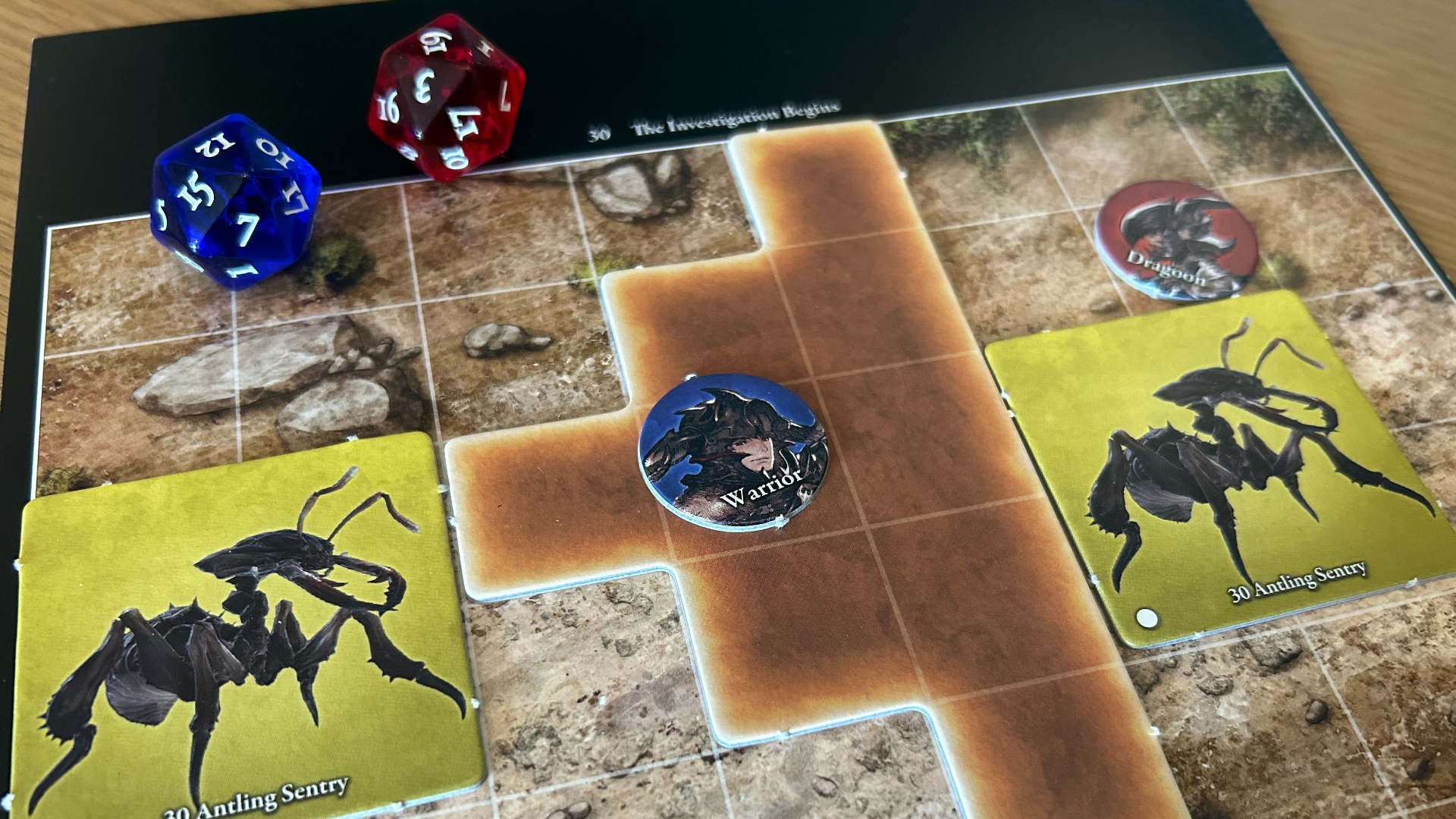
Those scenarios tie directly into the main scenario quest of FFXIV, featuring familiar faces, places, and even plot beats from A Realm Reborn. Non-FFXIV players may end up a bit lost in the references to specific factions, locations, and people, even with some added details in the book, meaning that it really is best enjoyed with a group of seasoned XIV fans able to appreciate its faithfulness to the game. That familiarity will also help overcome some of the shortfalls of the barebones rules themselves, which allow players to freely choose a species for their pre-made character (with no rules or modifiers attached) but fail to include a list of Eorzean inhabitants anywhere, for instance.
With character customization being such a core part of XIV, it’s also a shame not to see any kind of specific gear effects or deeper leveling options outlined in the Starter Set. You simply enter scenarios as a readymade character at one of three different levels – 30, 40, or 50 – with a set list of skills and no element of armor or weapon modifiers at all. It makes perfect sense in terms of the MMO’s full hotbars and level-matching to duties, but it does mean as a tabletop RPG it currently misses some of the player personalization and progression that lends itself to fully immersive roleplaying.
Should you buy the Final Fantasy XIV TTRPG Starter Set?
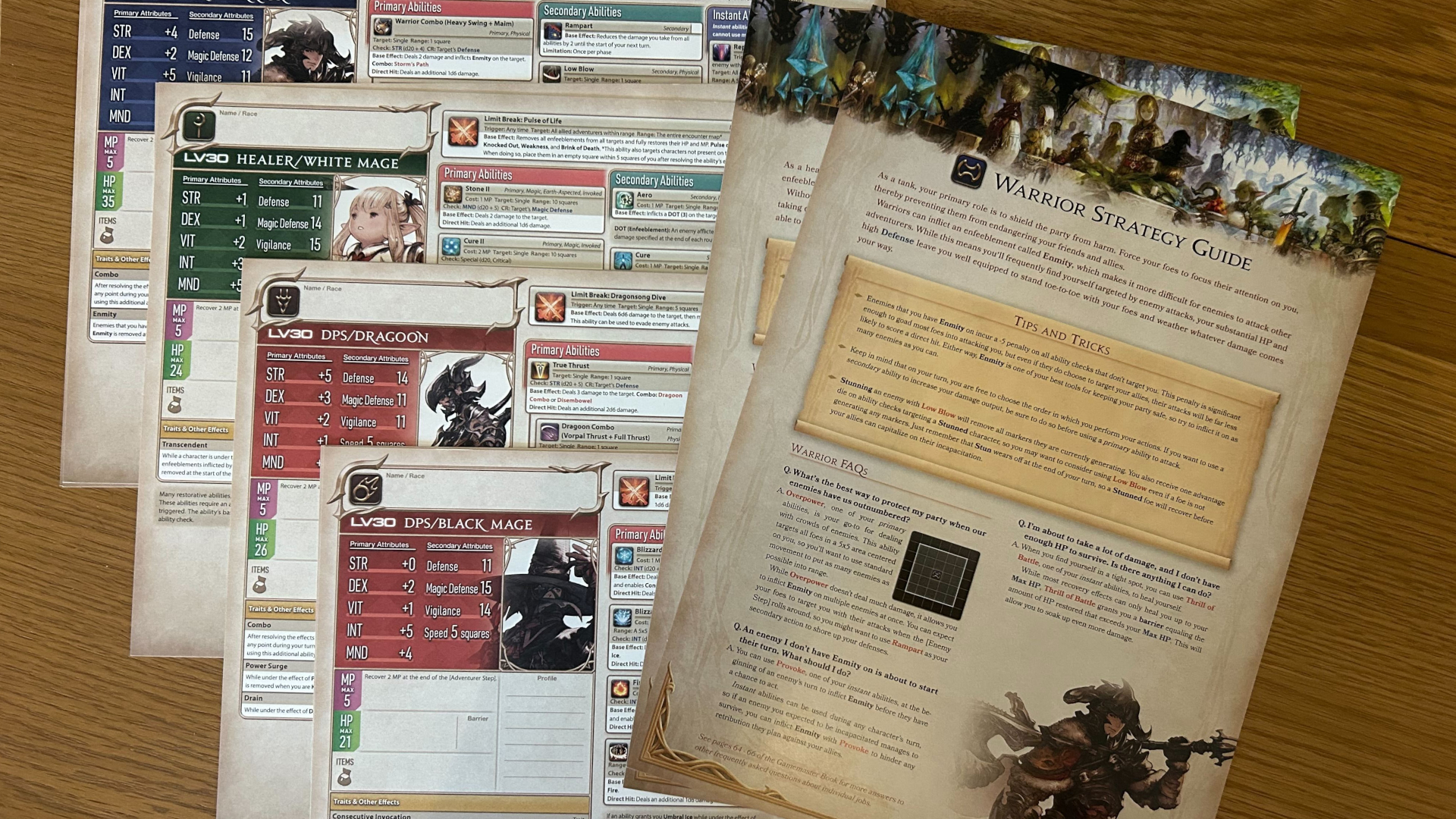
Final Fantasy XIV has become somewhat legendary and meme-ified for its generous free trial, which offers dozens of hours of gameplay across A Realm Reborn and expansions Heavensward and Stormblood. Its tabletop adaptation feels comparatively stingy, at least in this Starter Set. When its original gameplay ideas come together, this is a hugely enjoyable and satisfying adaptation of MMO gameplay that feels highly faithful and fun in its own right, serving as an approachable adaptation that fans can hop into comfortably. The speed and strategy of combat shines bright, the jobs and quests feel true to their on-screen counterparts, and the rules are easy enough to pick up in a single session while still having enough for players to feel involved.
If anything, I just wish there was a bit more of it here – more scenarios, more character options (promisingly, the game’s creators have since released a Bard job as free DLC), more freedom to take the game beyond its limited, inflexible debut. Perhaps we’ve been spoiled by the video game and that’s asking a bit much of a Starter Set. Regardless, what’s here is enough to have whetted my appetite for the full rulebook – in that respect, perhaps this tease of what’s to come does exactly what it needs to.
Buy it if...
✅ You’re a Final Fantasy fan looking to take your first step into tabletop roleplaying
This is the first official Final Fantasy RPG, and it’s not a bad one at that. With light rules, scenarios and mechanics taken directly from the MMO, you’ll quickly feel right at home.
✅ You find Dungeons & Dragons a bit too rules-heavy with combat taking too long
You’ll still be rolling a d20 here, but adding up your modifiers is much easier. Combat flows quickly, with the thrill of dodging AOEs and you’re always guaranteed to hit.
Don't buy it if...
❌ You haven’t played Final Fantasy XIV
You’ll be able to get by, but the jobs and scenarios in the Starter Set are so indebted to Eorzea that it’s hard to recommend over other fantasy RPGs if you’re not a XIV diehard.
❌ You enjoy the character creation and customisation of other TRPGs like D&D
The Starter Set is extremely limited on character options, with no gear, no progression system and only four jobs to pick from in the box.
How we tested the Final Fantasy XIV TTRPG Starter Set
Disclaimer
Our reviewer purchased the Final Fantasy XIV Starter Set directly from Square Enix.
Our reviewer served as Game Master for a full group of players including a mixture of Final Fantasy XIV fans and tabletop RPG regulars. They played the included scenario from the starter set.
For more, check in with our guide on how we test board games and tabletop RPGs or the GamesRadar+ review policy.
Looking for other recommendations? Don't miss the best board games, or these must-have board games for adults.

I have been writing about tabletop gaming, video games and pop-culture of all kinds for over a decade. As well as writing for GamesRadar+, I’ve been an editor and journalist for outlets from Dicebreaker, Eurogamer and Rock Paper Shotgun to Kotaku, Tabletop Gaming and MCV, as well as appearing across BBC radio and television, The Washington Post, NPR, and more as an industry expert. I’ve also contributed to a book celebrating Metal Gear Solid and even been the voice of an advert for a local caravan seller. When I’m not playing board games, tabletop RPGs and trading card games, you’ll probably find me watching anime, listening to K-pop or obsessing about cats. Follow me everywhere @liquidmatt.
